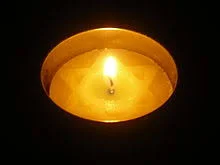This is the text of the letter I sent out to the Babson College community today,
on the eve of Yom HaShoah:
Thursday is Yom HaShoah, the annual day in the Jewish calendar that commemorates the annihilation of European Jewry during World War II. Seventy-four years after the liberation of Auschwitz and the defeat of the Nazis, it is a time for sober reflection about what the legacy of the Holocaust means to us who are now three and four generations removed from it.
In truth, all Jews today carry within them the legacy of the SHOAH (the Jewish term for the events called “the Holocaust”), although each carries it in a different way. Many Jews have branches on their family trees that simply break off. Others grew up with memories passed down from grandparents and great-grandparents about survival in the most miraculous, or most horrific, of circumstances. Others simply know the stories, and have a vague sense of responsibility because of the legacy of this painful history. It is part of us, forever.
Yom HaShoah seems especially resonant this year. Surveys of Americans tell us dispiriting news. Two-thirds of millenials (and 41% of all Americans) do not know what Auschwitz was; 22% of them never heard of the Holocaust (or aren’t sure if they have). The remaining survivors of the death camps are elderly today; in a few years, there will be no living eyewitnesses to the crimes of the Nazis and their enablers.
And the emerging trends of hate, violence, and white supremacy are on our minds this year. The murderous attack at the Chabad synagogue of Poway, California last week - six months after the massacre of Jews on a Shabbat morning in Pittsburgh - in the name of white nationalism conjures up great horror among us on this Yom HaShoah.
This week, the ADL released its annual study of antisemitism in America. In 2018, it recorded 1,879 antisemitic incidents in the United States, including the bloodiest in American history (the assault in Pittsburgh). This number is the third-highest annual number that the ADL has ever recorded. This is why many Jews, young and old, are asking questions we've never asked in our lifetimes: How safe are we here, really?
What is there to say or do? I think the answer from Jewish tradition is twofold. There is a famous saying by the great sage Hillel from over 2,000 years ago (it would be a cliché if it weren’t so perfectly accurate): “If I am not for myself, who will be for me? But if I am only for myself, what am I? And if not now, when?”
“If I am not for myself”— this is why Jews take the legacy of the Shoah so personally. Jewish survival, and its transmission to the next generation, is an absolute obligation for us; the Shoah makes that message only more profound. This is part of what the State of Israel means to us: There is a refuge; a safe place (recalling that the whole world, including America, turned its backs on many victims of the Nazis); and, not insignificantly, a Jewish army to defend itself. The Shoah isn’t the reason Israel exists (its roots extend far earlier than the War), but it does explain the passion with which its supporters will defend it.
In other words, this response to the Shoah is: AM YISRAEL CHAI: The Jewish People lives. And every Jew has a responsibility to make it so.
“But if I am only for myself”— That “but” is crucial. The Shoah didn’t start with death camps; it began with the increasing dehumanization of Jews, and propaganda that gradually eroded rights and liberties to the point where we were turned into something less-than-fully-human. Denial of rights leads to oppression. And that leads to neighbors abandoning and attacking neighbors; which led to genocide. It was systematic, it was thoughtfully planned, and it was almost successful.
This idea, too, seems particularly profound in 2019. The massacres of Muslims at prayer in Christchurch, New Zealand remain a fresh wound. As does the assault on Christians in Sri Lanka. And the burning of three black churches in Louisiana last month. Just to cite the three most notorious, and most recent, examples of the current rise of hateful violence.
In other words, the other commanding voice of the Shoah is to stand up against the dehumanization of anyone, anywhere. To say to every tyrant: “Not on our watch.” To know and understand our neighbors - and to defend and protect them.
That is what is at stake in the memory of the Shoah. That is what we mean when we say “Never Again.”
